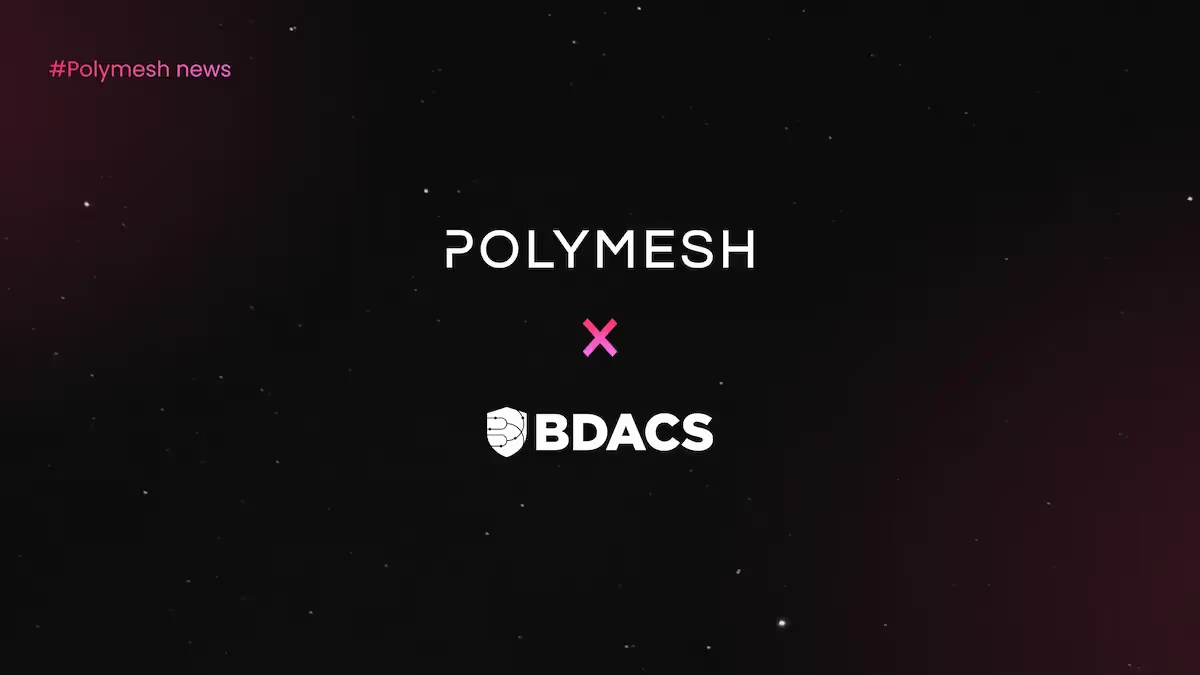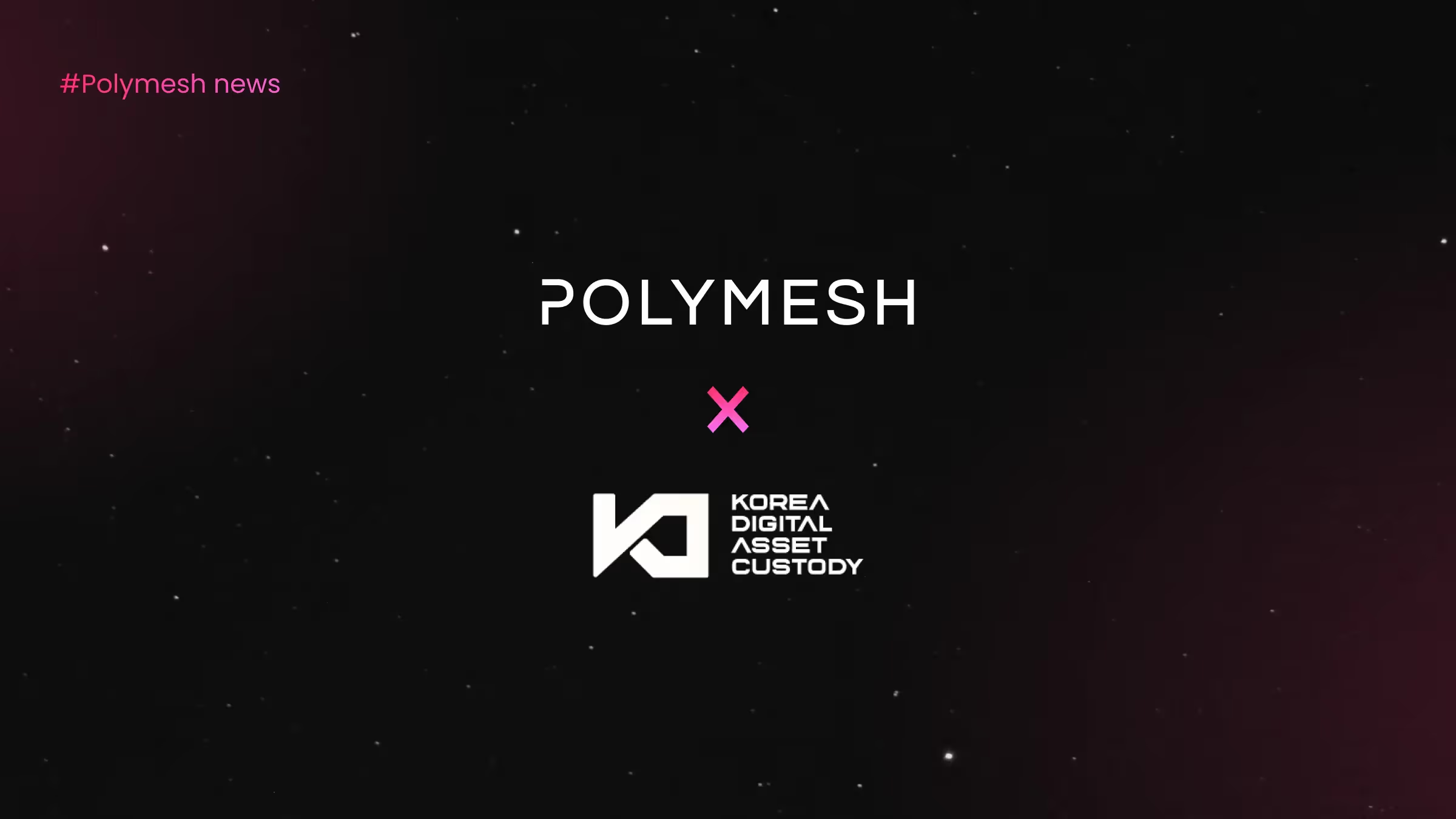South Korea's booming asset tokenization market: key drivers and future opportunities
South Korea has made impressive progress in integrating asset tokenization into various industries and establishing a regulatory framework for digital assets. The security token market in South Korea is expected to surge, with projections indicating it could reach US$287 billion by 2030.
Polymesh had the chance to attend both Korea Blockchain Week and Blockchain Week Busan in 2024, where the nation’s Web3 advancements were showcased while promoting global collaboration.
A report by Tiger Research, prepared for Korea Blockchain Week, highlights South Korea’s growing prominence in the Web3 market is driven by real world asset (RWA) tokenization, presenting domestic and international investors with long-term opportunities as regulations evolve.
Here we take a look at the asset tokenization market in South Korea, including its appeal, popular asset types for tokenization, its recent performance, and future predictions.
The appeal of digital assets in South Korea
Digital assets are particularly attractive to South Korean investors due to concerns about the political-economic climate. The South Korean government is actively regulating the crypto industry and digital assets sector, promoting growth while addressing predatory practices. President Yoon Suk Yeol, who received significant support from younger voters due to his pro-crypto stance, is committed to integrating digital assets into the economy.
South Korea’s younger generations view cryptocurrency and other digital assets as an alternative path to prosperity in the context of a high youth unemployment rate, rising inflation, political uncertainties, and because of their familiarity with electronic payment systems. The tech-savvy nation is an early adopter of new technology, with a culture where new technological innovations and opportunities are easily embraced.
South Korea’s daily crypto trading has surpassed the local stock market, reflecting this enthusiasm. Reportedly, 6.45 million Koreans (12.5% of the population) are registered on domestic exchanges. Over half of South Korea’s 82 registered large conglomerates including Samsung, SK Group, LG Energy Solution, and Lotte, are engaging in Web3 initiatives.
Much of the hype is shifting towards real world assets (RWA), or the integration of blockchain technology into traditional tangible and intangible assets for new product innovation, investment opportunities, ownership models, and prosperity in what are traditionally illiquid markets.
Tokenization allows for fractional ownership, enabling investments in high-value assets without the traditionally requisite high capital. By removing ownership barriers, tokenization enhances liquidity and fosters a more equitable landscape for wealth generation. Immutable transaction records improve trust and efficiency while allowing for real-time tracking, while automated operations reduce the need for intermediaries and associated costs.
How are South Korean regulators encouraging tokenization?
South Korea’s Financial Services Commission (FSC) has authorized the Korea Exchange (KRX) to create a market for trading security tokens, allowing investors to trade fractions of traditional RWAs to help alleviate issues where investors’ funds were previously tied up in illiquid investments. The National Assembly is discussing regulatory improvements for the same sector.
Notably, regulatory boundaries will not permit the tokenization of assets related to uncertain businesses, including real estate project financing (PF) and gambling. Tokenized assets must undergo objective value assessment, with issuers required to disclose pricing and investment conditions to investors.
FSC Vice Chairman Kim So-Young has praised the potential of tokenized securities, noting their ‘intrinsic value’, unlike other virtual assets such as cryptocurrencies. These securities are expected to drive South Korea’s digital assets market, bolstering local industries by driving domestic and foreign investment through tokenization and fractional ownership.
On a municipal level, the same attitude is observed by the city of Busan, which has been loud in its plans to become known as Korea’s major blockchain hub. Buan shifted focus from launching a cryptocurrency trading platform favoring crypto tokens like Bitcoin (BTC) and Ethereum (ETH) to one favoring digital assets. The Busan Digital Asset Exchange (BDX), launched at Blockchain Week Busan 2024, is helping realize the city’s dream of becoming a major blockchain hub along with various other city-initiated developments, policies enabling “regulation-free” and innovation zones, funds, startup resources, education, strategic partnerships, and standards, as illuminated in our blog post “Insights from Busan: the next major blockchain hub?”
What types of assets will be tokenized in South Korea?
Regulatory clarity, government initiatives, and strong industry alliances are fueling the maturation of real world asset (RWA) and security token offerings (STO) in South Korea. The asset tokenization market is rapidly expanding and diversifying into South Korean industries driven by advanced technology and economic strength.
Asset tokenization is set to improve access to investment opportunities and enhance market liquidity for various traditionally illiquid assets, with RWAs actively reshaping industries by providing unprecedented access to high-value assets for individuals and underserved markets.
Equity tokenization
In equity tokenization, companies issue shares in token form, providing startups and other companies with better access to capital and enabling broader investor participation via blockchain through more liquid trading of equity shares.
South Korea’s equity market suffers from what the industry mocks as the “Korea discount”, where companies receive lower valuations compared to global peers. As a result, the market is one of the lowest rated in the world, despite boasting top tier companies in technology and manufacturing.
Recent years have observed a massive increase in retail investor participation in the Korean equity market, thought to support President Yoon Suk Yeol’s ‘corporate value-up program’, which aims to level the playing field between conglomerate owners and minority investors. Tokenization and trading on retail exchanges will expand this participation, boosting support for the initiative and further evening the landscape
Equity tokenization is likely to gain popularity in South Korea as the technology matures, regulatory clarity increases, and markets worldwide embrace the digital assets shift. One company involved in equity tokenization is Shinhan Bank, Korea’s oldest bank and equity backer of Polymesh node operator KDAC. Shinhan partnered with Korean blockchain startup Directional to develop a blockchain-based stock lending platform.
Debt tokenization
In debt tokenization, debt instruments are represented as tokens, improving transparency and efficiency in the trading of debt securities such as bonds and loans.
South Korea’s debt market has been heating up in 2024 as investor demand grows for bonds issued by securities companies. The issuance market is dominated by large securities firms such as Hana Securities, KB Securities, Korea Investment and Securities, NH Investment and Securities, Samsung Securities Co.,and Shinhan Securities.
As demand grows in the debt market and the RWA space matures, demand for tokenized debt securities will likely follow. South Korean company Woori Bank has a deal with fractional investment marketplace Piece to offer security tokens reportedly with SME financing as a target, which could include debt securities in addition to equity.
Other financial products
Other financial products set to benefit from tokenization include structured products, receivables, and sustainability initiatives such as green bonds and carbon emissions trading. This latter category is contentious traditionally, rife with controversies and greenwashing accusations, but some think the efficiency, transparency, and tracking enabled by blockchain could restore some credibility.
Green bonds are financial products – technically debt securities – that help mobilize capital to support products, expenditure, or assets with climate and environmental objectives. Carbon trading is the exchange of carbon credits, and includes both regulated offset credits and voluntary ones.
In the second experiment in the Bank of Korea’s wholesale central bank digital currency (CBDC) trials, to focus on using CBDCs to settle financial transactions, the Korea Exchange will simulate a carbon credit trading market where CBDCs will be used for settlement. Korean institutions building tokenization platforms regularly cite carbon emissions trading as an example of RWA, further showing the openness of the industry to integrate blockchain technology with carbon trading. Carbon credits are also one of the products local media report as potentials for the Busan Digital Assets Exchange.
Real estate
Real estate tokenization allows physical real estate assets to be represented by digital tokens, enabling fractional ownership of properties and bringing ease and liquidity to the real estate market.
Foreign investors are increasingly drawn to South Korea’s real estate market for its economic stability, favorable location, and government policies supporting foreign direct investment. Real estate tokenization provides both domestic and international investors with easy access to the market through low-capital investment opportunities in high-value real estate assets.
South Korean companies Kasa Korea, Lucentblock, and Funble each have approval from the FSC for the Sandbox Special Exceptions as innovative financial service providers, actively focusing on commercial real estate across Korea (with Kasa focused mainly in Seoul’s Gangnam area) through retail assets such as shopping malls. The three companies utilize profit-making securities represented by tokens and trustee disposal trust structures to facilitate the tokenization and distribution process, instead of the prevailing Special Purpose Companies (SPCs) setup. This method enables direct investment in individual real estate properties on par with the easy tradability of the stock market.
Commodities tokenization
In commodities tokenization, physical commodities such as gold, oil, and other raw materials are backed by digital tokens, allowing for more efficient trading and investment through blockchain platforms. Tokenizing commodities offers increased liquidity, accessibility, transparency, and efficiency to what are large, complex, cumbersome markets often subject to geopolitical events, supply and demand dynamics, and frequent regulatory changes.
Tokenized commodities – particularly gold, precious metals, agricultural and livestock products – are the first assets expected to be offered on the Busan Digital Assets Exchange. South Korean digital asset startup Creder has already delved into tokenized gold, launching $GPC (Gold-Pegged Coin) on the South Korean blockchain Klaytn. GPC is a 1:1 backed gold token and reportedly the first gold token offered on DeFi outside of Ethereum. Creder and Klaytn Foundation have plans to expand support to precious metal RWAs beyond gold in the future.
A more uniquely Korean commodity which is set to hit exchanges in the future is Korean beef. South Korea’s government was an early supporter of using blockchain to enhance traceability in the supply chain for Korean beef, but as the RWA market grows, more talk is being given to tokenizing Korean beef investment contract securities. KB Securities is reportedly hoping to tokenize Korean beef to offer Korean beef fractional trading, as evidenced by its alliance “ST Owners” formed in early 2023 that includes Stockkeeper, an investment platform for the Korean beef industry.
Intellectual property
Tokenization of intellectual property (IP) converts the ownership and rights of IP assets into digital tokens on the blockchain for more effective management. Through fractional ownership, tokenization enables a wider range of investors to participate in IP investment with lower capital, while smart contracts and automation can fuel instant royalty payments when assets are used or licensed.
South Korea’s intellectual property market is shooting for $14.5 billion in value by 2026. The eight-largest trading nation exports technology-intensive products winning some of the top world market share. These products require specialized parts and equipment, to which patent rights in Korea are valuable for both domestic and overseas manufacturers. Thriving industries include consumer electronics, the automatic sector particularly with electric vehicles (EVs), healthcare including medical devices and digital health solutions, and information technology (IT). Korea also ranks high in research and development (R&D) investment, fueling further growth in the Korean economy and IP market.
Now, it looks like tokenization is coming to some of the patents and intellectual property assets that grant the nation’s status as having the fourth largest volume of patent applications in the world. Tokenized intellectual property is one of the asset classes promoted by the Busan Digital Assets Exchange, and STIP IP Exchange uses blockchain technology to facilitate trading of patent technologies. Tokenization platform IX Swap is actively engaging in tokenization of IPs through collaboration with companies such as BuySellStandards, which owns a portfolio of Korean content IP assets. Intellectual property for Korean cultural content, particularly related to K-pop, is also the partnership objective shared by Musicow and Woori Bank, one of the nation’s largest financial institutions.
Art and collectibles assets
In art and collectibles tokenization, art and collectibles assets are digitized into tokens, giving investors ownership of physical assets and associated rights. Art tokenization is useful to enable fractional ownership of valuable artworks and collectibles, or fuel smaller artists and projects through crowdfunding and revenue sharing.
Art tokenization is well experimented with in Korea compared to other jurisdictions. Art trading platform Yeolmae became the first officially approved platform to resume operations after a 2022 halt on similar services due to tokenized art’s classification as securities. Yeolmae is authorized to sell shares of Yayoi Kusama’s artwork “Pumpkin.”
Another art marketplace platform is ARTBLOC, which enables purchase and trading of fractional ownership in investment-grade private artworks, making fine art more affordable to the everyday consumer. Its first test was David Hockney’s ‘Pictured Gathering with Mirror’, which opened art buying to younger generations with 71% of investors in their 20s and 30s. A similar platform is fractional art sculpture investment platform TESSA, while cartoon funding solution FIX could help fund local animation of Webtoons.
South Korean companies like Modhaus have been gaining attention for integrating blockchain technology with the $10 billion K-pop industry, introducing new business models where fans can collect idol-related NFTs as utility tokens for voting in the idol group’s operations. Other companies with ventures into Web3 include HYBE the largest K-pop agency that manages popular bands BTS, SEVENTEEN, and NewJeans, and fan-artist platform Momentica.
Given K-pop is a major global cultural export for Korea, it’s likely that firms will seek to capitalize on advancements in blockchain technology and rising consumer demand to integrate K-culture, art, and entertainment assets further.
Alternative investments such as shipping and maritime financing
Most if not all common asset types make strong candidates for tokenization in South Korea, but it’s actually the more unconventional assets like carbon emissions trading, real estate, commodities, intellectual property, art and collectibles that are drawing most attention. There are even some alternative assets often overlooked as a RWA, such as the case study of shipping.
Maritime finance involves complex markets with massive investment potential. It’s a multi-billion-dollar, boom-and-bust industry, where losing money is as easy as gaining it. Nevertheless ships are essential in the global economy—we rely on them for the global trade servicing other sectors—and tokenization offers a new portal for participation.
Tokenization of ship and maritime finance opens the industry for increased investment by both individual and institutional investors. As with other RWAs, blockchain brings transparency, security, and better compliance to ship assets while enabling higher levels of public participation through fractional ownership on a global network.
Various South Korean firms are involved in tokenizing the ship industry, leveraging the nation’s reputation as the world's top global shipbuilder. Korea receives more than 30% of the world’s ship orders, and this August 2024 surpassed China for the crown of world’s largest ship exporter. Shipbuilding contributes to 10% of the nation’s GDP.
South Korean Klaytn Foundation is in plans to develop a RWA tokenization with ship-related assets held by the shipping subsidiary of Indonesia’s Korindo Group, which the two companies hope will enhance liquidity and diversify investment channels. Mirae Asset Securities is also embracing ship financing via RWAs with the Korea Land Trust and HJ Heavy Industries, while SK Securities has a Memorandum of Understanding (MOU) with Korea Maritime Asset Trading (KMAX) and Eugene Investment and Securities for a maritime asset-related token securities business. Woori Bank’s partnership with Piece is also reportedly targeting shipping finance as an initial RWA. Busan’s Digital Asset Exchange will encourage tokenizing the shipping industry as well.
How are tokenized RWAs performing?
The Korean tokenization market is expected to grow to an astonishing $287 billion by 2030 . This growth is attributed to technological developments, a supportive regulatory environment, increased consumer demand for innovative digital solutions, and the normalization of RWA.
Despite this, tokenized real world assets in South Korea are still in an early, exploratory phase, so it’s difficult to provide real performance results just yet. While the government has been keen to establish a regulatory framework, and many traditional and new players have involved themselves in providing the necessary technology infrastructure to support digital assets markets, the uptake of tokenized assets has been gradual. Asset type, market maturity, regulations, and development pace have made some asset classes appear more viable for the long term than others.
Within the art world, asset tokenization’s recent performance has been described as underwhelming. Seoul Auction Blue’s offering of shares in Andy Warhol’s “Dollar Sign” Series 8 achieved a subscription rate of 86.9%, falling short of its 700 million won ($523,364) target. Similarly, Yeolmae Company’s offering for Yayoi Kusama’s “Pumpkin” initially attracted attention but saw many investors relinquish their rights on payment day. The reputation and prominence of Warhol and Kusama were not enough to combat factors such as overall market downturn, high fees, complex ownership models, and limited apparent liquidity.
Although these initial token offerings in the art sector are disappointing, there’s optimism for the broader security token market—as described above, dozens of companies in Korea are planning to issue tokenized assets for sectors such as Korean beef, ship and maritime financing, real estate, entertainment, gaming, and intellectual property, which could attract more interest as the RWA space matures. These asset classes may align more with South Korean investors’ appetite, particularly where access has been limited to high-value assets, such as commercial real estate.
RWA assets that play to the nation’s technological and cultural strengths, such as ship financing, electric vehicles, and K-culture intellectual property, are especially poised to gain foreign attention leveraging Korea’s reputation. These sectors are projected to boost tokenization in a way that fosters the local economy while driving development, helping the country remain a global leader in innovation.
What can we expect in the future?
Looking ahead, South Korea is set to expand its tokenized securities market, propelled by regulatory clarity, advanced technology, and supportive government initiatives. As the market diversifies, the opportunities for innovation and investment across various asset classes—ranging from real estate to commodities to intellectual property—are anticipated to multiply.
The asset tokenization market in South Korea is dynamic, supported by a mix of global leaders as well as both established and emerging local firms, reflecting the country’s focus on pioneering technology, quality, and sustainable growth.
The future of asset tokenization in South Korea will be shaped by continued innovation, increased consumer interest in RWA, and push towards greater automation. Government initiatives and strategic international partnerships are expected to accelerate this growth, despite challenges from competitive pressures and regulatory hurdles. With its robust technology foundation and progressive outlook on blockchain technology integration, South Korea is well-positioned to lead the evolution of asset tokenization.
Korea-based companies like BDACS and KDACS are unlocking new opportunities for asset owners and investors looking to utilize the Polymesh network.









































